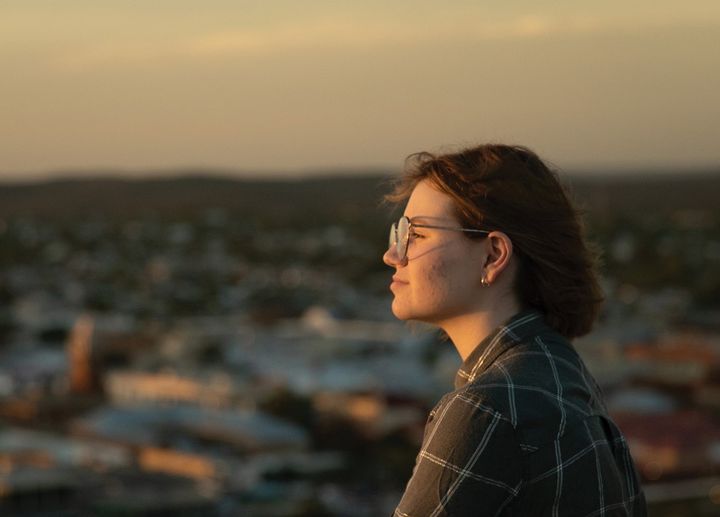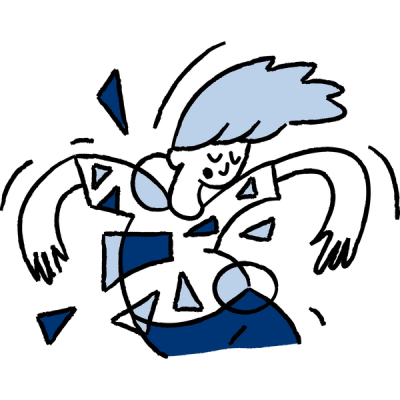Gracie's Story
Gracie Gribble is 19, funny, very smart, bubbly and bursting with ideas and dreams. But her life hasn’t always been like that. From the age of eight, Gracie was dealing with the early stages of bipolar disorder. Unfortunately, when you live in an outback mining town, finding help can be tough. On top of that, Gracie had three siblings suffering with health issues of their own. Perhaps it wasn’t surprising people presumed her tears were a natural reaction to her situation.
Listen Here
Read transcript
Warning: 0:00
This podcast series will share personal moments of connection and deeply felt experiences. If anything you hear has a triggering effect, please reach out to someone who can help keep you safe. Or remember you can find lifeline at any time on 13 1114
Gracie: 0:19
I definitely lost a lot of time to depression. You know, I think about all the, all the days I could've spent playing with my friends at eight and nine and then I think about all the hours I could have spent, you know, with my dad, even at eight, nine and 10 before everything happened. You know, I think about how I could have enjoyed my first few years of high school. Built a solid foundation, had a great group of friends, had a well rounded sense of security. You know, I think about how I could have focused on my music and had a high school band and done all the things that I always wanted to do. But depression always held me back, kept me locked away, kept me away from everything that I could have been.
Beverley: 1:15
That was Gracie Gribble. She's 19 funny, very smart, bubbly, and bursting with ideas and dreams. But as you just heard, her life hasn't always been like that. From the age of eight, Gracie was dealing with the early stages of bipolar disorder. Unfortunately, when you live in an Outback mining town, finding help can be tough. On top of that, Gracie had three siblings with health issues of their own. Perhaps it wasn't surprising people presumed her tears were a natural reaction to her situation.
Gracie: 1:49
So I first realized that I had an issue, uh, when I was eight years old. I knew something was wrong with me because I could see that everyone else was in this, you know, almost different world. You know, I myself felt so angry and irritable all the time when all these other children seem so happy, you know, all these other children seem to be able to have fun. And so, you know, when I felt that distance, when I felt that divide, that's what I realized that something was, something was amiss. I cried at everything at the drop of a hat. You know, mum would say to me were, you know, we're having this for dinner and all of a sudden I felt like my world was crashing down. Yeah. I would cry about things that were completely unnecessary. You know, I'd spill a glass of water, I'd step on something and I would just feel like my, my world was ending.
Gracie: 2:38
I wasn't a mean or nasty child, but I knew that, uh, I would react unnecessarily to some things that she would say and react, react unnecessarily to some things that she would do. And that, that made me, you know, different and that that may be difficult to deal with. And that made me different from the other children. I lived in a rural Outback town and, you know, help was hard to find. You know, I lived in a town where we had a couple of, uh, services from mental health, but none specific for, you know, children, young children at, you know, eight years old. Um, there wasn't much for me. There wasn't much help. So I think, um, my mum realized that she'd have to wait a bit longer before I was deemed old enough to be able to seek those resources. I would lock myself in my room and scream and cry and spend hours just upset and bawling. And, you know, my mother didn't know what to do. You know, most children throw tantrums because they want something because they want, you know, some kind of outcome. But I would just throw these tantrums because I couldn't escape the way that I felt.
Gracie: 3:54
Yeah. I was 10 when I first realized that I wanted to die. The idea that someone so young can want to leave the earth is just something that was so strange and so foreign to me. You think about it on an existential point of view. You think, you know, I'd, I'd only been alive for 10 years of my life, you know, and I knew that, I knew that I, I'd only been alive for 10 years of what could possibly be a hundred. Yet the feeling was so permeating, was so deep, such an ingrained part of me that I almost couldn't fight it. And I almost couldn't, you know, push it away.
Gracie: 4:33
When I was 11, my family and myself were in a car accident and my father was severely injured. And as a result of that, there was a significant toll on my family. And it was almost like now there was justification for the way that I felt justification for how depressed I was, justification for how sad I was. And so now you could almost classify the way that I felt as normal. And I think that's why I didn't get help until when I did because the way that I was feeling almost seemed like a response to that situation.
Gracie: 5:13
The following year I started high school, I was 12 and I started engaging in some behaviors that were quite dangerous to myself, uh, as a way to deal with the way that I felt I started self-harming. And of course, you know, the closest person in my life was my boyfriend Lochlan and he, you know, noticed what I was doing, you know, noticed how I was treating myself and you know, immediately said, you know, there's something, something wrong.
Lachlan: 5:45
So Gracie and I became friends, I think when we were in year seven, so around 11 or 12 years old, I think we started talking in the canteen line. We met at the canteen line and I noticed that she had a pokey ball, a iPod case. So I was like, Oh, I need to talk to her. And we kind of just clicked really. I started, uh, noticing Gracie started having issues, uh, somewhat early on. I think maybe year eight, so around 12, 13 years old. She was acting just slightly odd. She was, she was slightly off compared to a lot of other people that I knew and talked to at that time. And um, I noticed, uh, she's, I think, I don't know if it really started with this, but one of the first things I remember is sort of the, uh, the self harm that she was doing whilst at school. And I was like, Oh, okay. She was, uh, drawing on herself, um, kind of really roughly. She was like, I'm drawing pictures, but like the skin was raised and you know, I was like, Oh, I don't know. That's it. That's something you should be doing. Um, I didn't really feel confident bringing up this was like, you know, probably it was very much probably a sensitive issue and, uh, I think I was too anxious to sort of cross that boundary at that point. Even though I knew I, it was affecting her. Um, as, as we went on being friends and talking more and more, uh, we started both opening up to each other a little more and that's when I started finding out more about her issues. I think everyone else sort of looked the other way because they didn't really feel what was going on. I, I could sort of feel that she was just off, you know. And um, I think everyone was sort of too young and absorbed in, you know, school and this, you know, 13, 14 year old drama and such. I didn't really give up on her I, I, that's how I approached the situation. I just decided I'm not gonna give up on her. She's too special. She's too amazing. And I know she is, even though she will say things that might feel hurtful, even though she might say things that are just bizarre. It's, I can't give up on it. Cause I know at her core, she's a wonderful, wonderful, amazing person. So I didn't give up on her. I talked to her pretty much every night. I remember she would, she would go out, um, outside her house on to her fence cause that's where she could get reception and I'd be on my DS trying to like refresh the page every five seconds so I could see her messages.
Gracie: 8:34
It's hard to explain at that age, what the justification is for why you do these things. It's hard to explain why you, why you would want to hurt yourself. And I think because I was so young, it was a scary thing, you know, it was scary to him. It was scary to me because we didn't know where to go for help. We didn't know what to do. You know, where previously I'd been told that I was too young, we wondered still whether or not I'd be too young to get help. I was extremely depressed at that time. I was in one of my phases, you know, I'd go six months, three months of happiness, six months of sadness, three months of happiness, six months of sadness. Of course, what followed after the six month period of depression when I was 13 was, uh, was another up period. But this time it was far worse than anything I'd experienced before. The highs were so high that I almost couldn't believe what I was feeling. It almost felt as if sadness didn't exist. And because I felt this way, there were no limitations, to my inhibitions. And so, you know, I was in art class one time when I was 14 and I distinctly remember my art teacher saying, don't eat the paint. It has, you know, all these dangerous chemicals in it. The next thing you know, I was in the, the cupboard in the artroom eating blue paint. You know because I was afraid of nothing. Nothing scared me. I could do anything, be anything. I could experience anything I wanted.
Beverley: 10:20
Gracie's come so far she can laugh at these stories now, but they weren't funny at the time.
Gracie: 10:26
So the second favorite story. I love it. Um, another similar incident occurred when I was, I was on top of a PE building, you know, sitting on the railing ready to jump because I thought I was a bird. You know nothing in that moment could have convinced me that I couldn't fly. I believed anything was possible.
Beverley: 10:51
Gracie became so desperate he wanted to die. When she told her mom, she frantically sought help. After a long wait, they saw two psychologists, they simply diagnosed anxiety and depression and sent Gracie away with worksheets and exercises. Gracie did her best to follow their advice. She felt worse than ever.
Gracie: 11:10
You know, I'd had this huge up period that I couldn't explain that no one was explaining to me. If I was depressed and anxious, then how come I felt so happy? How could I have that such feelings of joy if, if I was supposed to be depressed, I requested to see a psychiatrist on the suggestion of my mother. You know, I felt that what I was feeling was too chemical. I felt that none of the therapy made a dent in how I felt. And so we, we contacted, you know, child and adolescent mental health and they said the waiting, this was several months. There were just too many people my age, too many people, my age seeking that help. And so I was just added to the end of the waiting list and I had to wait for, I could get in to see him.
Gracie: 12:12
I remember distinctly there was a school excursion that we all went on. And this was when my friends chose that they didn't want to be friends with me anymore and I distinctly remember just crying all the time. I didn't care who saw me, I didn't care where we were. I just cried the whole time. And I just know that all those photos, I'm, you know, weeping tears because it wasn't that I'd lost something great, is that I felt that this was a symbol that I would never be able to have anything any greater.
Gracie: 12:58
So my mom had noticed that there were some symptoms in the way that I acted that were very similar to my grandmother who has bipolar type one. And so she, she suggested to me that I might have bipolar myself. And so when I went to see the psychiatrist in my mind at the back of my mind, I had this idea in my mind that maybe, you know, maybe this is what I have. Maybe I don't have depression, anxiety, and maybe this is why the treatment hasn't worked, but I didn't say anything to the psychiatrist, I didn't suggest it to him because I didn't want to, you know, I didn't want to speak on things that I wasn't educated about. And unfortunately, um, that was not his diagnosis at the end of the day. That's not what he believed. And so I was put on an anti depressant and my course of treatment went further into treating depression and anxiety. I think taking those antidepressants was one of the worst things that I did as a teenager. They made my symptoms far, far worse than I could've imagined that they could have become. All of a sudden, I was extremely rapid cycling. In the mornings I'd be happy and manic and you know off my rocker. And then at nights I'd be extremely depressed. Every night I'd message Lachlan and tell him how I, I just felt that I wanted to die and that I was just so, so sad.
Lachlan: 14:33
So living in a rural and Outback, a town like we grew up in, it was, so, so, difficult to find help and not even just help the right help. So it was like, where, do I go to, to help her? Where can she go to? For a while she was being a diagnosed with the wrong mental issues and yeah, it was just, it was very, very hard to find the right help.
Gracie: 15:00
A year later, my psychiatrist up the dose and my medication. I was still on the original antidepressant and I got even worse in order to deal with the lack of control that I felt. I started starving myself. You know, my situation just got even worse. I know that Lachlan especially found it extremely hard to deal with, you know, watching me deteriorate like that, you know, it was almost like my body started to match my mind. My mother noticed how I started to look and she kept saying to me, you know, just don't, just don't get any worse. Just don't get any worse as if, you know, if I just stopped and stagnated, then everything would be fine. You know, just don't get any worse. Everything can always get worse. It was around this time that I started getting severe migraines and I think now I can attribute that to, you know, dehydration and lack of nutrients and lack of, you know, sustenance my body. But, uh, I went to see the doctor and he prescribed me a beta blocker. Unfortunately, because beta blockers have a effect on, you know, mood, it made me extremely depressed. It was the worst depression I'd ever experienced up until that point. And, uh, that was when I attempted suicide.
Warning: 16:28
No one should ever have to face their darkest moments alone. Lifeline is here to help. Please call 13 1114 or visit lifeline.org.au
Warning: 16:43
Lifeline in no way encourages cessation of medicine without medical supervision. If you think the medication you are taking could be wrong, please raise this with your clinician or seek a second clinical opinion.
Lachlan: 16:57
It was probably the most upsetting moment in my life trying to tell my mother, my best friend was dealing with issues that, that, that to the point where she was wanting to kill herself. I couldn't get those words out. I like literally bawling my eyes out. I just couldn't get it out. So thankfully I did have my friend there to help me explain the situation. So yeah, it was, it was really, really rough. It was horrific in a way, and I don't want to say traumatic, but it's definitely gonna stay in my mind for very long time.
Gracie: 17:37
I was found and I was taken to hospital where I remained for several days. It was then that I had a stroke of luck and I met a professor that was visiting for a few days and, um, he requested to see me. I went to this meeting with him, surrounded by these doctors and nurses and he asked me several questions about my mood and about my, you know, my history. I told him everything. I told him how I felt. I told him, you know, symptomology of my, my illness, and he said, it sounds to me like you have all the symptoms of bipolar affective disorder. It felt amazing to finally have someone say it, finally, give me a diagnosis that fit the way that I felt. You know, depression and anxiety never felt right. Never felt like the right label for me. So when someone gave me a label that fit my symptoms, that fit the way that I felt that fit, the chemical imbalances that you know, carried in my brain was a sense of relief and empowerment.
Gracie: 18:38
I was first prescribed a mood stabilizer, but unfortunately it didn't work for me. Again, I was prescribed another mood stabilizer, but I, it didn't level me out. It actually may be just depressed. My first attempt at suicide was in May and following my second opinion in July, I attempted suicide again. I can't explain why I decided to do it.
Lachlan: 19:03
I felt so much love for her, so much empathy for her. I knew she could be a good person. I knew she was a good person. I knew that she could go on to do incredible things. It's not necessarily because, well, I feel bad for her. She's dealing with all these problems and I've got to be there for her. It's not really that it's, if there's anyone in this world, that can literally put a dent and change everything going on. It's, it's, it's Gracie Gribble it is her. I will say that for the rest of my life and I think that's why I stuck around because I just felt so much for her and at that point we were like best friends for like five years, so you weren't really going to break a bond like that. I'm not gonna you know, see her try and end her life and then just leave her at that. Even when she began to fix her problems, I still stuck around because I want it to be in her life and I wanted her to be in mine.
Gracie: 20:00
I found it extremely difficult to call out for help. Lachlan was the only person that I felt I could talk to was the only person that was there that I felt could listen completely and unfiltered. You know, I had my mum and I could talk to her, but you know, it was difficult. I called lifeline a number of times and I found, you know, that did help.
Gracie: 20:22
The only other thing that helped me was music was writing music. When I was finishing high school, there was the question of what I wanted to be and I didn't want to stay the person that I was any longer. And so I knew, that if I went to school and I did my work and I studied and I got an education that that would allow me to be the person that I wanted to be. After everything I've been through, I had to give something back. I had to make some kind of contribution back and what anyone else to feel the way that I did. That's why I chose psychology. It was interesting. Um, while I was studying, I learned a lot about medications and different types of therapy in different, uh, mental illnesses. And I almost figured out exactly what I wanted to be medicated with, what medication I wanted it to be on,
Gracie: 21:49
and it was that medication that when I finally got to it that made me happy, that may be better.
Beverley: 21:56
Gracie's doctor agreed with her diagnosis. He prescribed the medication she requested and for the first time she discovered what normal felt like.
Gracie: 22:05
I mean, you can't cure bipolar, you can't cure it, but you can make it better. You can medicate it to the point where it's livable. And so when I finally got on the combination of medication that I'm on now, the medication kicked in super quick, incredibly quickly. I'm only 19 you know, I'm lucky that I, that I have found it so quickly. I remember the first week that I was taking the anti psychotic that I'm on right now. I just felt this great calmness, this amazing calm. I felt like I had a warm hug all the time and I couldn't believe it. I couldn't believe how I felt. It's a strange feeling to be somewhere in the middle.
Gracie: 22:48
It's something I always dreamed about and thought about and imagined. But I didn't imagine it would feel like this. You know, when I feel like this, I feel like there are emotions that I have never experienced before. You know, when people, you know, laugh at my jokes or, you know, say something nice to me, I feel a sense of joy that isn't, you know, extreme, extreme. I don't feel extreme joy anymore. I just feel normal. Contentedness that's something I haven't experienced before.
Lachlan: 23:23
My family loves Gracie. They will treat anyone, who is a friend or, uh, a sweetheart of just anyone as their own family. And they will treat them with such kindness and compassion and warmth and giving and part of my caring, empathetic nature comes from my mother. So when the big hit came, she was definitely, she was definitely supportive. She loved her. She loved me. She knew that we loved each other. You know she was gonna support her no matter what and support me, uh, in her life no matter what.
Gracie: 24:00
To all those young people out there like Lachlan, I want you to know that you're exceptional human beings. What Lachlan did for me. I'll never forget, he'll always be the closest person to my heart. He'll always be the person that made the most difference in my life. And I know that there are so many of them out there. So many of them out there supporting other young people like me. I want them to know that it's okay to have your own problems too. It's okay to have your own illness. It's okay to have your own mental problems as well. You know, we're all battling our own demons. We all have our own things that we're, we're dealing with. You know and there is help out there for you too.
Lachlan: 24:41
It's, it's, so it's, it's surreal in a way. Like she's such an amazing, beautiful, strong person. Um, um, knowing her being in her life, that's a blessing, I reckon. Absolute Saint, that woman. So to hear someone like that, it's, you know, it hits you. It's like, Oh God, you know, and it's, in a way it's uplifting as well. When you think, it's such, it's such a like chain reaction of positivity and I, I sound like some sort of, you know, support person or you know, whatever. Anyway, uh, but yeah, that chain of positivity just keeps going and going and going. You know, you help someone else, you give them all your life and then they, you know, reciprocate. And they say I'm here because of you. I can do all of these things because of you, it uplifts you and you know, you feel inspired to do better in your life.
Gracie: 25:42
I guess what I want young people to know is that if you are struggling with a mental illness and you think that your diagnosis is incorrect and you think that something's not right, then there is help out there for you. There's nothing wrong with you. You're not, you're not a problem. You're not a burden. You're not different. You know, you're just individual. There's nothing wrong with being different. There's nothing wrong with having a point of difference. We call it mental illness because you know, we're, we're ill. It's an illness of the mind, you know, you can get better. There is always a way to get better. You're not broken. You're not broken to a point where you can't be fixed.
Lachlan: 26:35
Around my 18 birthday we went driving and stopped at a lookout and just sang songs to go. We just spent the whole like a good two or three hours just singing. Maybe not very good on my part. That's all right. But it was just, it's a magical moment of like, you know, in a way it was just this kind of turning of a new page for all of us. And I think that moment helps a lot of us. I think it helped Gracie see no, there is beauty in life. There is beauty in my friends and my family and everything. There's beauty in everything. And to me, obviously I was turning 18 and it was this step into adulthood and becoming my own person. It was this magical, magical time. And if I could relive that moment every day of my life without hesitation, I do it.
Gracie: 27:30
Life now is amazing. I moved to Melbourne and I play open mic's three to five nights a week. You know, I have so many musician friends. I'm playing my music and I'm getting it out there and I've made so many amazing friends through my work like you wouldn't believe the amazing people I've met from all over the world from all walks of life. You know, I have an amazing life and I'm so, so astonished that so much has changed in so little time, you know when you think about it, what seven years is a blink of an eye, you know from from that, from the beginning of high school to now. You know is a blink of an eye. From eight to now is the blink of an eye. It goes by so quick and to think where I've come from then to now is just absolutely crazy to me.
Beverley: 28:32
Thank you for listening to holding onto hope. Lifeline Australia is grateful to all our interviewees who share their stories in the hope of inspiring others. We also acknowledge all of you who provide support to people in crisis and those on their journey to recovery. If you found this podcast helpful or inspiring, please share it, rate it, write a review or subscribe wherever you download your favorite podcasts. If this story has affected you and you require crisis support, please contact lifeline on 13 1114 you can do this at anytime or visit lifeline.org.au to access web chat every night from 7:00 PM to midnight. If it's inspired you to be a lifeline volunteer or to donate, please visit lifeline.org.au With thanks to Wahoo! Creative for interviews, editing, and production, and the voice of lived experience, which is essential in the development of our work.





